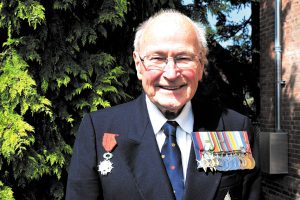French medal bestowed upon Canadian veteran
By Lookout on Jun 30, 2014 with Comments 0

War Veteran Peter Chance added another medal to his collection, the the Ordre national de la Légon d’honneur.
Seventy years after his ship, HMCS Skeena, took part in the D-Day landings, Cdr (Ret’d) Peter Chance received recognition from the French government.
Along with 500 other Canadian army, navy and air force veterans of the pivotal Second World War battle, the 93-year-old was named a Chevalier (knight) of the Ordre national de la Légon d’honneur, France’s highest honour.
Five hundred is all that remains of the more than 34,000 Canadian soldiers, sailors and airmen who participated in Operation Overlord and began to push German forces back out of France.
Chance and 14 other B.C. veterans gathered in Vancouver on May 21 to accept the medal from Consul General of France M. Jean-Christophe Fleury, who presented it on behalf of the President of France.
The event included dinner and speeches from dignitaries including Minister of Veterans Affairs Julian Fantino, Premier Christy Clark, and Lieutenant Governor of B.C. Judith Guichon.
Each recipient was assigned a cadet escort “to make sure we didn’t fall down,” Chance jokes.
Though he earned several other medals and awards through his more than 30-year naval career, this one is special, he says.
“It is very special because it recognizes Canadian participation in the Normandy landings.”
Chance was the navigating officer in HMCS Skeena when the allies made their Normandy assault on June 6, 1944.
As part of Escort Group 12, Skeena’s duty was to block German submarines from entering the landing area.
The most memorable moments of that mission came on June 8 when two homing torpedoes – designed to target the frequency of a ship’s propellers – streamed through the water and exploded in Skeena’s Canadian Anti-Acoustic Torpedo (CAT) gear.
It was a terrifying experience for the crew, says Chance.
“We saw these damn fish go whizzing by. The next thing, a periscope went by us and we fired our Hedgehog at it,” he recalls.
The ring of Hedgehog bombs landed ahead of Skeena and U953 disappeared, presumed damaged.
“We didn’t see it again and we couldn’t pick it up either. But obviously we had damaged it.”
That might have been the end of the story, but many years later, Chance got a phone call from Virginia, U.S.
A man with a thick southern accent asked, “Mr. Chance, were you navigating HMCS Skeena on the 8th of June 1944?”
Upon learning he had the correct Peter Chance, the man proceeded to say he had come to know someone named Karl Baumann, who was serving in U953 on that day. Just 19 years old at the time, he had been wounded on board and was taken to a hospital in Brest.
When allied forces overtook the area, Bauman became a prisoner of war and was eventually sent to Virginia to wait out the war.
“I was able to speak to Karl,” says Chance. “He said, ‘You know Peter, we were trying to kill each other on the 8th of June 1944, ya?’”
With a chuckle, Chance says he replied, “Absolutely.”
“Now we can be friends?” Bauman asked.
The two stayed in touch until Baumann died several years ago, and Chance even wrote the foreword for the book about Baumann’s life, “The Longest Patrol.”
“The common enemy was the sea,” says Chance. “We had no ill feelings toward these guys, you know, individually. They were the enemy, sure, but individually, of course not.”
Carmel Ecker, Staff writer
Filed Under: Top Stories
About the Author:





